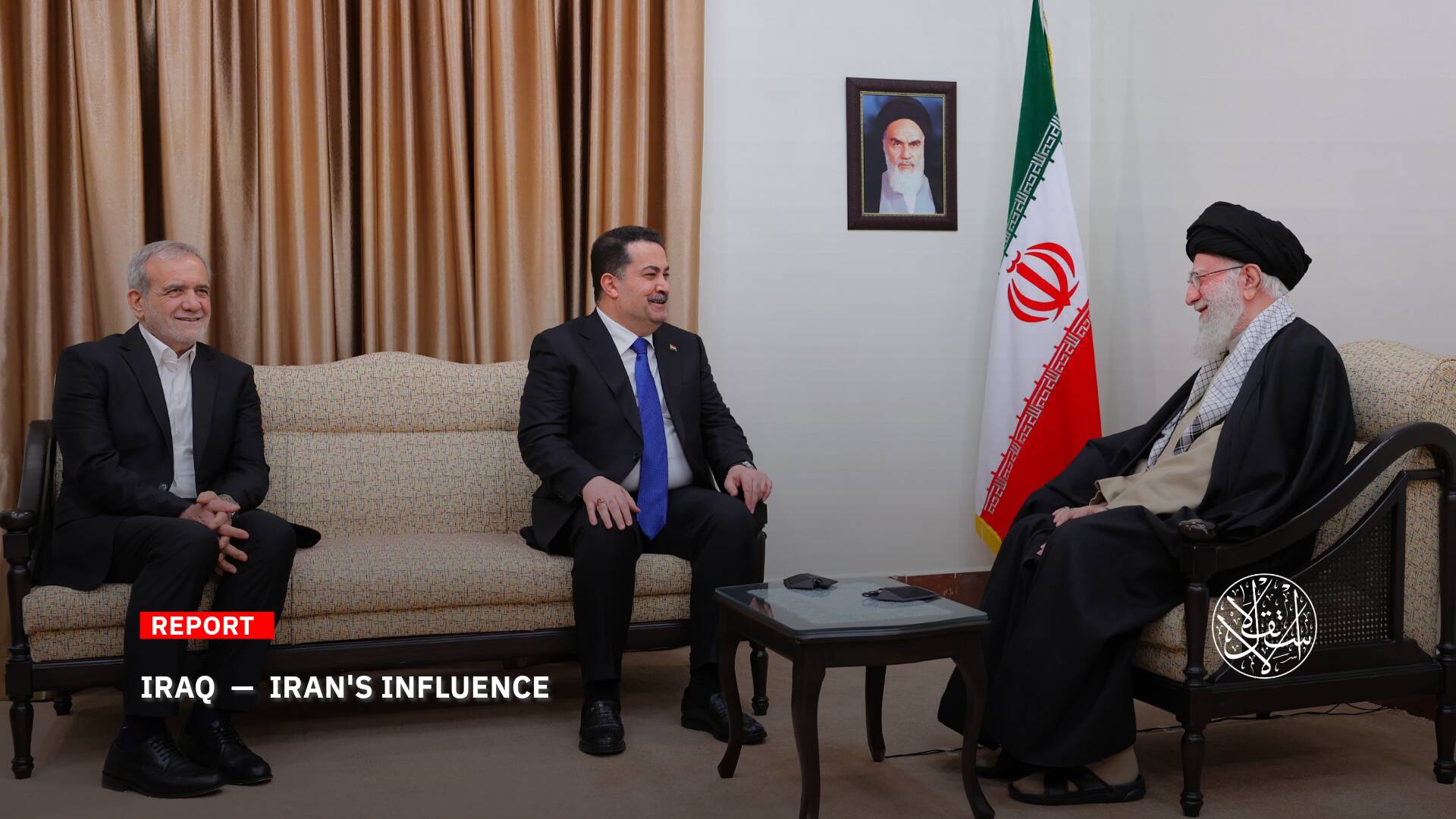How Deep Mistrust Ignited Conflict Within the Halls of the Israeli Government

“No government has ever fired the head of the Shin Bet, Israel's most powerful security agency.”
The disputes between Prime Minister Benjamin Netanyahu and Shin Bet (Israel Security Agency) chief Ronen Bar have exposed a deep-seated conflict within the government and brought the term ‘deep state’ back to the forefront in “Israel”.
Netanyahu's decision to dismiss Bar, and Bar's refusal, sparked widespread controversy and division within “Israel”, while officials, analysts, observers, and Israeli newspaper writers warned that Netanyahu is destroying “Israel” from within and bringing it one step closer to civil war.
This crisis was preceded by disputes between the governing coalition and the military establishment.
Meanwhile, the government also appears poised to hold a vote next week to dismiss Attorney General Gali Bahar-Meira, who has also become involved in the Bar case, emphasizing that the prime minister cannot proceed with the dismissal of the Shin Bet chief at this time.
Protests began on the Israeli street hours after Netanyahu announced his intention to dismiss Bar. Demonstrations erupted in rejection of the move, and protesters blocked several roads in Tel Aviv, which some considered a prelude to a return to street protests.
The opposition views the dismissal of the Shin Bet chief as a declaration of war on democracy and state security, while observers warn that if the government proceeds with its decision, it will be a political earthquake that will deepen the already severe internal divisions.
Unprecedented Dispute
Israeli Prime Minister Benjamin Netanyahu's decision on March 16, to dismiss Shin Bet chief Ronen Bar sparked a storm of Israeli reactions, which described the decision as unprecedented.
Netanyahu had announced in a recorded video his intention to dismiss Bar from his position, justifying the decision by citing a deep lack of trust between him and the head of the security service.
In a rare occurrence, Bar rejected Netanyahu's decision and set conditions for his termination, accusing Netanyahu of failure and incompetence.
He said in a statement published by Yedioth Ahronoth that he would remain at the head of Shin Bet until the return of all the hostages.
He called for the formation of an investigative committee with all parties, including the political, government, and prime minister, considering this a necessity for public security.
In an unprecedented move, former Shin Bet chief Nadav Argaman warned against Netanyahu's attempts to appoint a political figure to head the Shin Bet and attacked his government.
In response, Netanyahu accused the current Shin Bet chief of waging a campaign against him to prevent the necessary decisions to reform the security service after his failure on October 7, and described the public threats from the former Shin Bet chief as criminal and mafia-style.
Axios reported, citing Israeli officials, that Netanyahu had pressured the Shin Bet chief to resign for weeks, but he refused.
Netanyahu's aides have said he was inspired by US President Donald Trump's purging of the deep state and his decision to appoint loyalists to all key posts.
The dispute between Netanyahu and Bar intensified significantly after Netanyahu criticized the results of a Shin Bet investigation into the events of October 7, 2023, which was published on March 4, 2025.
The investigations implied Netanyahu's responsibility for years of failed policy that led to Operation Flood of Al-Aqsa, while the Shin Bet acknowledged its failure to limit Hamas's capabilities before the attack.
However, Netanyahu's office criticized the investigation's results, and Channel 13 reported that Netanyahu's entourage launched an unprecedented attack on the Shin Bet chief.
It is noteworthy that Netanyahu had recently removed Bar and Mossad chief David Barnea from the team tasked with negotiating a ceasefire and hostage exchange deal with Hamas in Gaza, claiming that they had taken a soft line in the talks and leaked unfavorable details about the government's position to the media.
Prior to the investigation crisis, Netanyahu had attempted over the past two years, under pressure from his extremist allies in the government, to remove the Shin Bet chief from his position for various reasons.
The most significant factor that fueled the dispute was Operation Flood of Al-Aqsa, the Shin Bet's issuance of warning documents regarding it, as well as Bar's position on negotiations for Israeli hostages and his criticism of the decision to keep the Israeli army in the Philadelphi Corridor.

Real Warning
Netanyahu's right-wing allies in the government welcomed his decision to dismiss Shin Bet chief Ronen Bar.
“This is what I've been demanding for a long time,” said Minister Itamar Ben-Gvir, while Minister Bezalel Smotrich commented, “It's a necessary step, and it would have been better for him to take responsibility and resign more than a year ago.”
The Israeli opposition announced its intention to petition the Supreme Court against Netanyahu's recent decision, citing what it describes as a conflict of interest.
Attorney General Gali Bahar-Meira informed Netanyahu that he could not initiate proceedings to dismiss the Shin Bet chief until a review of the legal grounds and evidence related to the decision was completed, citing the sensitivity of the case and the lack of precedent.
On his part, Benny Gantz, one of the opposition leaders, said, “The dismissal of the Shin Bet chief is a direct blow to Israeli national security and a move that will undermine unity in Israeli society for political and personal reasons.”
He noted that the timing of the decision seemed very strange given the ongoing investigation in the Prime Minister's Office, adding that anyone who disturbs Netanyahu would be targeted and undermined.
Former Minister Gadi Eisenkot said that Netanyahu is carrying out a purge of the heads of the security and legal services and threatening democracy.
“Netanyahu has lost the moral right to continue in office and is entrenching himself in a coalition based on blackmail and self-interest,” he added.
Yair Golan, head of the Israeli Democratic Party, described Netanyahu's decision as a declaration of war on the State of “Israel”, saying, “We will not allow Netanyahu to turn Israel into the dictatorship of a corrupt and disgraceful man.”
Israeli researcher and commentator Yossi Verter said that what is happening in “Israel” today is a real warning sign, as Netanyahu is destroying the country from within.
Verter added in an article in Haaretz, “The current prime minister is a corrupt man who corrupts others, acts irresponsibly, and abandons his citizens. He is dangerous, endangering democracy, national security, and the future of Zionism.”
Haaretz commented in its editorial, stating, “We must recognize that Netanyahu is tearing Israel apart, and if we do not replace him, the damage to Israel could be irreversible.”
The newspaper added: “Netanyahu wants to get rid of all his guards and anyone who might expose his failures and threaten his continued rule.”
In a related context, Yoav Limor, a writer and analyst for the newspaper Israel Hayom, said that “Bar's dismissal pushes Israel to the brink of civil war,” noting that this is the first time in the country's history that the head of a security agency has been dismissed.
The Financial Times warned of what is happening in “Israel”, stating that Netanyahu's move to dismiss the head of the Shin Bet will lead to further unrest in “Israel” as the repercussions of the intelligence failure prior to the October 7 attack continue.
“Bar's intended dismissal is likely to deepen the divisions between Netanyahu and the country's top legal officials,” it added.
The newspaper noted that all Netanyahu is doing is trying to evade responsibility for the October 7 attack.
Yedioth Ahronoth published a map of dismissals and resignations, a list of Israeli officials who were in office on October 7, 2023, and who subsequently fell. This indicates that Netanyahu succeeded in bringing down everyone, but not himself, because he refused to bear the responsibility for the failure.

Deep State
In another context, Professor Moshe Cohen-Elia, a professor of Israeli constitutional law, said: “In Israel, the Western deep state sought the support of the Biden administration and the American deep state under the guise of saving democracy.”
"It succeeded in convincing Biden to ignore Netanyahu for an entire year, impose sanctions on settlers in the West Bank, and fund the Israeli protest movement with huge sums," he added.
He considered Netanyahu's trial on corruption charges to be part of the deep state's work.
Taking advantage of the deep state, Netanyahu is moving to appoint people close to him and his government to head the security services.
After dismissing Army Forces Chief of Staff Herzi Halevi and appointing Eyal Zamir, a close confidant of Netanyahu, the intention is to appoint a religious figure from the far-right Religious Zionism party as head of the Shin Bet. This will then entail dismissing Attorney General Gali Baharav-Miara due to her persistent opposition to government decisions.
Mossad Director David Barnea was also dismissed from leading the Israeli delegation to prisoner exchange and ceasefire negotiations in Gaza and replaced by Strategic Affairs Minister Ron Dermer, a close confidant of Netanyahu.

Israeli legal experts spoke about the legal framework for the dismissal of the Shin Bet cheif, explaining that this position is not changed solely for personal or political reasons.
They emphasized that the Shin Bet chief serves the state and society as a whole, not just the prime minister, and therefore can only be dismissed for clear professional and security reasons.
Although the prime minister has the authority to dismiss the Shin Bet director, some cases may require the approval of additional bodies such as the Knesset or the Security Council.
The Israeli judiciary can review the dismissal decision if it is appealed to the Supreme Court, whose ruling is superior to that of the Knesset or the government.
Sources
- Netanyahu moves to fire intel chief who is investigating his aides
- Political Leaders React to PM's Dismissal of Shin Bet Chief
- Netanyahu's decision brings Israel to the civil war abyss
- Benjamin Netanyahu says he will sack Israel’s domestic spy chief
- A Real Warning: By Firing the Shin Bet Chief, Netanyahu Is Destroying Israel From Within
- Irreversible Harm: Netanyahu's Crusade Against Gatekeepers Pushes Israel Closer to Autocracy
- Netanyahu, emboldened by Trump's 'deep state' purges, goes after Shin Bet head











